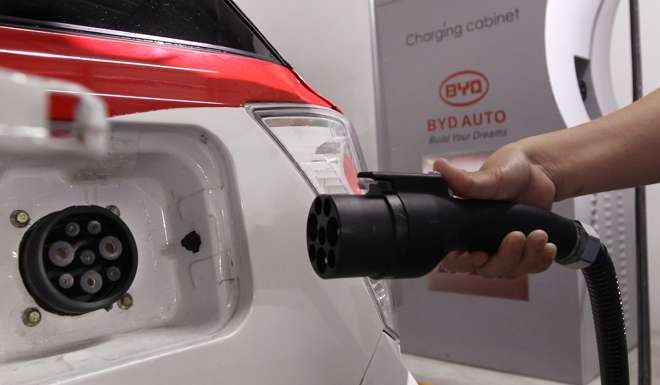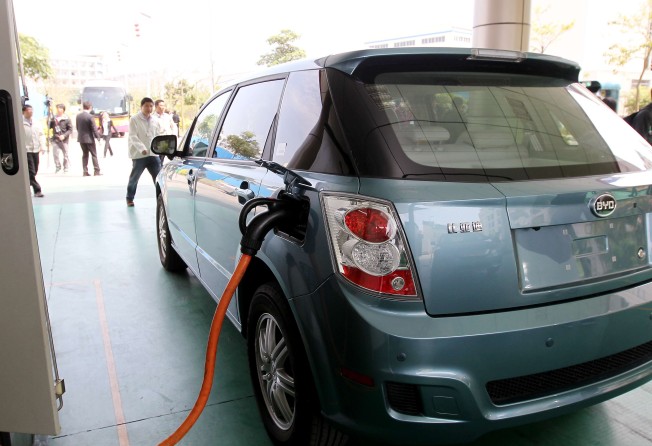
Bicycle battery maker Tianneng Power broadens focus to include power cells for green cars
Hong Kong-listed battery maker Tianneng Power set to open 1.6 billion yuan facility to build lead-acid battery cells for green vehicles

Tianneng Power International, the mainland’s largest maker of lead-acid batteries for electric bicycles, will expand production of batteries for electric cars in a bid to tap the country’s fast-growing environmentally friendly vehicle market.
The company became the latest major industrial player to unveil its ambitions of tapping the mainland’s “green” car sector amid Beijing’s push to protect the environment.
“We are determined to expand in the presently untapped segment,” Chen Minru, senior vice president of Tianneng, told the Post. “There’s a huge potential in the market and Tianneng has to rev up the expansion pace.”
Hong Kong-listed Tianneng recorded sales of 300 million yuan in batteries for electric cars during the first half of this year. The company, which is based in Changxing, Zhejiang province, has a target of 10 billion yuan in annual sales by the end of 2020.
Zhang Tianren, chairman of Tianneng, announced during the weekend that the company would start trial operations of its new 1.6 billion yuan manufacturing facility of lead-acid batteries for electric cars in January 2017.

The new production facility in Changxing will have an annual capacity of 15 million kilovolt-ampere-hours and is expected to generate sales of 6 billion yuan a year.
The batteries Tianneng makes will be earmarked for mini electric vehicles whose maximum speed can reach 80 kilometres an hour.
“Tianneng has an ambition of becoming one of the world’s leading energy solution providers,” Chen said. “To become a global player, we need to secure a strong foothold in the domestic market because of its mammoth size.”
On the mainland, more than 330,000 “green” cars were sold in 2015, a more than fourfold increase over the previous year.
For the six months of this year, sales of the environmentally friendly cars in China were up 135 per cent from the same period in 2015.
Tianneng turned out to be one of the top beneficiaries from China’s enthusiastic embrace of battery powered vehicles.
China’s industry-wide sales of lead-acid batteries are likely to tally 20 billion yuan in 2016, up from 100 million yuan in 2002.
The Chinese government intensified efforts to improve environment protection and has extended billions of yuan in subsidies for electric, hybrid and fuel-cell cars.
Other incentives such as free driving permits, lower parking fees and consumption tax exemptions were also offered in an effort to bolster sales of environmentally-friendly vehicles.
Miao Wei, the minister for industry and information technology, predicted earlier this year that alternative fuel car sales on the mainland would more than double in 2016.
Beijing has set a target of 5 million new-energy vehicles on the road by 2020.
The minister said that the quality of batteries was one of the major concerns for the long-term development of the electric car market.
Apart from the automakers such as BYD, a clutch of domestic firms including Levdeo and Shifeng are investing heavily in the electric vehicle sector.t.
It is estimated that at least 10 billion yuan would be invested in the development and production of new electric vehicles across the country in the next three years.
Raymond Tsang, a partner at consultancy Bain & Co said that mainland drivers were beginning to show an interest in electric cars owing to government subsidies and the upgraded technology.
Industry officials also called upon authorities to issue specific rules governing the recycling of batteries as a way to minimise pollution.
Used batteries are collected by small, unlicensed vendors who often dispose of them recklessly after extracting valuable metals such as lead.
Tianneng is among the few battery makers in China licensed for lead recycling.
Chen said the recycling business would become one of the company’s three core businesses, alongside the production of batteries based on lead-acid and lithium. Tianneng’s shares have risen 15.5 per cent this year to close at HK$7.54 on Friday. The company reported net income of 269.2 million yuan in the first half, up 477 per cent from a year earlier.